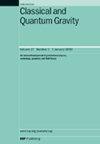引力波退相干量子叠加
IF 3.7
3区 物理与天体物理
Q2 ASTRONOMY & ASTROPHYSICS
引用次数: 0
摘要
理解量子力学系统和引力之间的相互作用是统一这两个基本思想的关键一步。最近的理论发展探索了时空的全局特性如何导致量子空间叠加失去相干性。特别是,这种相干性的丧失与记忆效应密切相关,而记忆效应是引力辐射的一个突出特征。在这项工作中,我们探索了来自遥远来源的引力辐射如何使量子叠加退相干。我们确定了引力波源的记忆分量和振荡分量对退相干的单独贡献,分别对应于硬和软引力子发射。一般来说,记忆贡献占主导地位,而退相干的振荡成分强烈依赖于猝发关闭时的相位。这项工作证明了量子系统如何从与经典引力场的相互作用中失去相干性。我们还评论了这种效应的电磁模拟,并讨论了它与引力情况的对应关系。本文章由计算机程序翻译,如有差异,请以英文原文为准。
Gravitational waves decohere quantum superpositions
Understanding the interplay between quantum mechanical systems and gravity is a crucial step towards unifying these two fundamental ideas. Recent theoretical developments have explored how global properties of spacetime would cause a quantum spatial superposition to lose coherence. In particular, this loss of coherence is closely related to the memory effect, which is a prominent feature of gravitational radiation. In this work, we explore how a burst of gravitational radiation from a far-away source would decohere a quantum superposition. We identify the individual contributions to the decoherence from the memory and oscillatory components of the gravitational wave source, corresponding to hard and soft graviton emissions, respectively. In general, the memory contributions dominate, while the oscillatory component of the decoherence is strongly dependent on the phase of the burst when it is switched off. This work demonstrates how quantum systems can lose coherence from interactions with a classical gravitational field. We also comment on the electromagnetic analogue of this effect and discuss its correspondence to the gravitational case.
求助全文
通过发布文献求助,成功后即可免费获取论文全文。
去求助
来源期刊

Classical and Quantum Gravity
物理-天文与天体物理
CiteScore
7.00
自引率
8.60%
发文量
301
审稿时长
2-4 weeks
期刊介绍:
Classical and Quantum Gravity is an established journal for physicists, mathematicians and cosmologists in the fields of gravitation and the theory of spacetime. The journal is now the acknowledged world leader in classical relativity and all areas of quantum gravity.
 求助内容:
求助内容: 应助结果提醒方式:
应助结果提醒方式:


